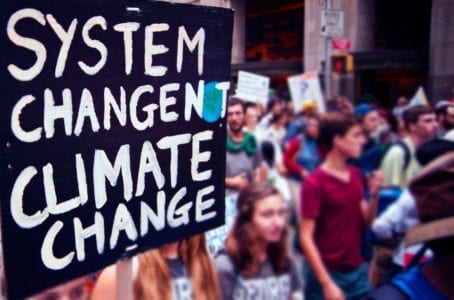Usufruct: a historical lens on a modern crisis
“We owe future generations a better economy, not a bigger one”, Ben Gallant writes, recovering the concept of ‘usufruct’ for inter-generational politics. By focusing on growing the economy we forgot about all the other things that are handed down through the generations; not just the environment but cultures, communities and institutions as well. For many years now, we have consciously broken the terms of our ‘usufruct’—it’s high time we revisited the terms of the contract again. (This blog first appeared on Open Democracy.)
The Green New Deal has reignited old debates between the left and right in countries around the world. Setting aside climate deniers (if only it were that easy!), the argument is between those who believe a radical large-scale spending program to combat climate change will stimulate economic growth and those who fear it will inflate government debt, placing an undue burden on our children. This disagreement about how to stimulate the economy is nothing new and unlikely to be resolved in time to address climate change. So, before we return to the same old debates, we should pause, take a step back and reconsider our responsibility to future generations.
I recently came across a very interesting letter from Thomas Jefferson to James Madison. The letter concerned a concept called ‘usufruct’. This is the idea of a short term loan of property in which the recipient may enjoy the fruits of the property as long as they do not damage or wear it out. Jefferson writes that “the earth belongs in usufruct to the living”. Essentially, each generation’s entitlement to enjoy the fruits of the plant is temporary and predicated on the assumption that they keep it in good condition for their children. The word usufruct comes from Latin and literally translates to ‘use of the fruits’. We can think of Jefferson’s earth as an orchard, each generation is allowed to pick the fruits, but they should not cut down the trees.
Writing in 1789, Jefferson’s ideas were mostly about the ownership of land and the inheritance of debt. In the letter, he argues that no generation should take loans that cannot be paid off within their lifetimes. However, in the interim between Jefferson’s letter and today’s society, our perceived relationship to the future has changed.
In the early 20th century, modern economists lead by Keynesians promoted the idea that spending (and even debt) now could produce benefits for the future. No longer did economists talk about saddling future generations with debt but expanding the economy to give them a better life. Later, the concept of human capital led to the idea that generations pass value down through the knowledge they accumulate. This has caused us to think of the economy as the primary usufruct between generations and to conclude that by growing the economy we are handing down a surplus not a deficit. While a shift in economic theory in the 1980s reintroduced concern over government debt in some quarters, economic growth remained king.
Unfortunately, neither Jefferson nor Keynes understood the scale or severity of environmental degradation that society would generate in coming generations. For much of the 19th and 20th century the usufruct was being broken without knowledge. However, for many years now we have been consciously breaking the terms of our usufruct with the future. Maybe it is time we revisited the terms of the contract.
One solution is to count up all of the environmental harm and weigh it against all of the economic gain; but before we do this, we might want to think about what we mean by economic gain. The economy is growing, but it is also growing more fragile, more divided and less sustainable. In many developed economies, each extra unit of GDP has been doing less for the health, security and happiness of its citizens. Meanwhile, much of the growth in recent years has been supported by ever-increasing individual debt, which unlike national debt creates insecurity and instability.
The economy we are handing down to the next generation is capable of producing a vast quantity of material goods, but many of the most important parts of life are just as (if not more) difficult to attain. Rents are rising, and the NHS is overstretched. Our relationships and our capacity to care are not expanded or enriched by economic growth: a larger economy will not provide inner-city children with access to nature, and wealth becomes irrelevant if our ecosystems collapse.
While Jefferson does not explicitly cite the environment, he is clear that for the usufruct to remain intact any changes that are made by the current generation should be reversible by future generations. This is clearly not the case with current trends in climate, biodiversity loss and resource use. Therefore, not only does the environment need to be considered alongside the economy but it deserves a privileged place as a unique store of irreplaceable value.
By focusing on the economy we forget about the other things that are handed down through the generations; not just the environment but cultures, communities and institutions. Each of these legacies is separate and deserves to be preserved in its own right. By sublimating all other usufructs to that of the economy we diminish, homogenise and weaken the world we pass on. This is not to suggest that cultures and communities should not change, it is simply that much of the wealth that is passed on between generations cannot be measured by sterile economic indicators. Moreover, attempts to maximise these economic indicators are often in tension with preserving the inheritance we leave our children.
This re-examining of our relationship with the future requires that we reconsider our understanding of productive work. If the value that we hand down to our children can be found in our cultures, communities and environment as well as our economy, we need to rethink where we are applying our energies. The current economic system creates incentives to certain types of economically productive work at the expense of other elements of human flourishing.
Before we can seriously attempt to provide our children with the inheritance they deserve, we need to change the economic incentives that direct our attention away from what is really important. By reducing the incentive to produce material goods, it is possible to address our environmental and social deficits at the same time.
While it may be too late to repay all of the environmental debt we have accrued, we are still able to contribute to a more sustainable future. We can begin to make up for our debt to our children by building an economy that enables them to avoid breaking their own usufruct; not a bigger economy but a better one.




